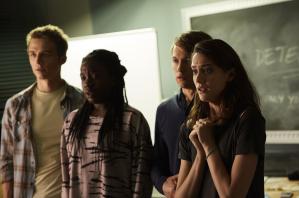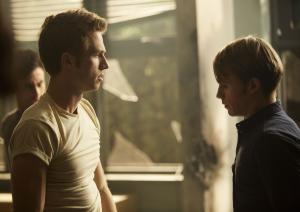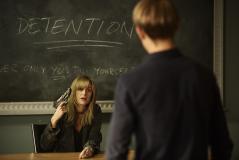
Starring: Katherine Kelly, Sophie Hopkins, Greg Austin,
Fady Elsayed, Vivian Oparah, Jordan Renzo with Ferdy Roberts
Writer: Patrick Ness
Director: Wayne Yip
Producer: Derek Ritchie
Executive Producers: Brian Minchin,
Patrick Ness, and Steven Moffat
Released Online (BBC Three) - 19th November 2016
This review contains spoilers.
Its another conundrum to unravel for our gang of do-gooders, having been abandoned to unsupervised detention by Miss Quill. This is no normal punishment, however, as they have been cast outside space and time itself, thanks to the rift. Remaining trapped in one room, they all feel mounting alarm. The view outside the door and windows is a blank void.
At first they wonder if a mysterious segment of an asteroid could be the means to their escape. It turns out the rocky entity forces their deepest, most heartfelt feeling to the surface, as one by one they clutch it in their palms.
Truth and honesty unchecked can be damaging, and so it proves as the ties of friendship are strained to their very limit. Relationships come under heavy, unexpected scrutiny, for respectively Charlie and Matteusz, and April and Ram. Tanya also is taken on a difficult emotional path in terms of her insecurities over being the youngest of the group.
It eventually becomes clear that someone must take a stance, even if the ultimate sacrifice is the only pathway. Otherwise, this group of five could be reduced to just the one lone survivor..
**
The premise of a bottle episode has been done many times before in television. In Buffy, one particular episode involved the main characters forgetting who they were, but once they regained their memories, their relations were drastically altered. This story somewhat echoes that plotline, and does similar work in germinating the seeds laid out in prior stories. Enough craftsmanship by the writing, acting and production teams is involved, however, to make this tale feel like it is both relevant to today, and to be heartfelt in the emotional journeys presented.
One noticeable difference between Detained, and all preceding Season One efforts, is that effectively the core narrative is told in real time. Charlie describes the ordeal they go through as lasting "forty-five minutes". But in that time, a lot of things a considerable sea-change has occurred in the relations they have with each other.
This proves that sometimes sound, fury, and visual effects are not always needed for making a drama show work. Believable and fleshed-out characters will always be vital for any discerning viewer. It is also a neat conceit that the enemy in this story was the ruthless survivor of a group of five, and at one point it appears the same outcome will play out with our lead characters. The series may have had some moments of tonal confusion - particularly in Nightvisiting - but it is very good at bringing across themes, and parallels between different characters and/or groups.
Mystery is often one of the best methods to make a work of fiction gripping. Patrick Ness certainly gets the balance right between exposition and speculation, as the quintet are able to piece together enough to clarify how and why events are unfolding. We never get the full details of why this is all happening. The enigmatic prisoner's original appearance, where he came from, and just what motivation and method applied to the many murders he committed; all this remains open to our imagination.
It turns out that the Prince of Rhodia is anything but an angel, despite his mild manners and awkwardness that on the surface. His willingness to kill all civilisation on Earth, and that only his romance with Matteusz holds him back, is rather alarming. One wonders if Quill is actually the most immoral one after all. Of course Charlie's Polish boyfriend is able to reassure him repeatedly, and this helps the group overcome their predicament. Some damage is done to their relationship in the short term with the 'confessions', but perhaps it will bode well in the long run.

We also witness Ram's deep feelings for April, but how he senses she does not quite return those feelings on the same level. She has perhaps every reason to be cautious about a man in her life getting close to her and being trustworthy, given the way she and her mother suffered (and continued to suffer) through Hew's actions years ago. Indeed, some exposition over the horrific incident to befall her family features when April clutches the meteor.
I know I was not alone in finding the competitive footballer's match-up with the thoughtful violist something that came out of left field. Certainly their moment of physical intimacy in Episode Four was one of the lowlights of the show, and further made ludicrous by the juxtaposition with the Shadow Kin. There never was proper discussion of how Ram was able to move on from losing Rachel, who died in such a manner that she could not even be allowed a proper burial.
Fortunately this episode manages to make the romance feel engaging, and the performances of both Sophie Hopkins and Fady Elsayed continue to feel authentic. I appreciated how April and Ram have different attitudes to the past, present and future, and how that defines their chances of staying together. They also are responding rather differently to not being - in biological terms - fully human anymore. The viewer really is made to care that their union needs considerable work from both parties.
All of the regular main cast continue to impress. Certainly with Ness' best script thus far there is little room for anyone to have a bad day's work. But perhaps the most notable performance comes from Jordan Renzo as Matteusz. I had been slightly indifferent about the character, and indeed he had barely featured in the early episodes. Here though he has enough screen time to fully establish himself as likeable and engaging. Although for much of the plot it may appear Charlie is the least angry, it actually transpires that it is his lover who has more control in the pressure-cooker situation. Renzo shows a good range and seems to thrive on the stage like confines of the one room here, so hopefully the dynamism can be followed through in other stories as well.
A lot of good drama thrives on not taking itself stone cold seriously, and having undercurrents of humour, or even absurdity. This episode shows poise in achieving this delicate contrast. One highlight involves April moving the situation along by announcing she is going to pick up the prisoner/meteor, but undercuts it by asking if anyone will "stop" her, accompanied by a comical look on her face.
Another fine moment of levity: Charlie's limitations in coming across as an actual human teenager- through being transplanted into 21st century Earth by the Twelfth Doctor - are exposed when he does not realise that 'Narnia' is a fictional realm, and quickly guesses it is somewhere in Canada. There is also of course the subtext that they have been transported to another dimension, and time has progressed back on Earth in notably different pace to their own in the void.
A few minor issues hold Detained back from being a true masterpiece. The voice for the alien prisoner is serviceable in and of itself, but is just a touch too similar to how the Shadow Kin sounded. The decision to have the classroom lights flicker and the group cower under desks makes sense within the context of the storyline, but is one of the few moments that fails to really resonate as imaginative or notable.
Also, perhaps an opportunity was missed to have some more screen time for Quill when any given person who held the stone could be made to imagine her presence, relating to the influence she has had. Katherine Kelly is really impressing me, and reminds me of Michelle Gomez in being a villainess that can inspire some sympathy.

Some profanity - but by no means the strongest kind - features in dialogue for both April and Ram. However, it manages to still feel within context. Tanya at one point utters "airbag" as an insult, which cast my mind back to Sophie Aldred's brave attempts with Ace's more emotional dialogue, in the Seventh Doctor era.
But overall this instalment sees the series raise the bar, and iron out some flaws in earlier episodes. It boasts some skilful and dynamic direction from Wayne Yip, that lives up to the sterling work of the other directors involved in Class. Enough groundwork has been done for the final pair of stories to make this particular school term end strongly. Certainly that cliffhanger with Quill 'unshackled' will make me rush to my BBC I-Player connection in double-quick time.
The episode's confidence and effectiveness is such that it deserves to be a companion piece to the 2008 classic Midnight, and thus help justify once again the amazing scope that there is in the extended Doctor Who universe.















